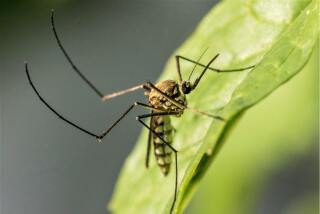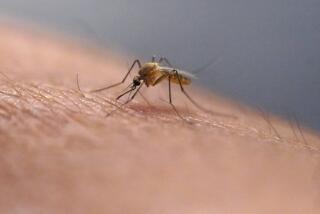Woman Dies of W. Nile Virus
- Share via
An 88-year-old Long Beach woman infected with West Nile died Monday in a case that health officials said underscores the vulnerability of elderly people as the virus spreads across California this summer.
The woman, who was hospitalized for two weeks, is the first confirmed fatality from the illness in Los Angeles County and the third statewide. Officials suspect that a 91-year-old Northridge woman died of the virus Friday but will not know for certain until tests are completed this week.
West Nile virus has killed almost 600 people since it was first detected in New York in 1999. According to the national Centers for Disease Control and Prevention, the majority of those who died in recent years were elderly. In 2002, the average age of West Nile victims was 64. So far this year, the average age has been 72.
Health experts said two main reasons explain why the elderly are the most susceptible to serious forms of the disease. As people age, their immune systems weaken. Also, the elderly tend to have medical conditions, such as diabetes or high blood pressure, that make it harder for immune systems to fight off new diseases. Health experts point out that the elderly are the most sensitive to a variety of illnesses, including the flu and pneumonia.
The first person to die from West Nile in California was a 57-year-old Fullerton man who had diabetes and had undergone dialysis treatments for years. The second victim was a 75-year-old San Bernardino County man. The 91-year-old Northridge woman who died Friday was a cancer survivor.
The Long Beach woman, whom authorities did not identify, started feeling sick with fever and muscle weakness July 26, health officials said. She was hospitalized July 28 at the Kaiser Permanente center in Bellflower and went into a coma a few days later, said Dr. Darryl Sexton, health officer with the Long Beach Department of Health and Human Services.
“Her age alone was the significant factor,” Sexton said. “It’s recognized that the elderly and people that are immune-suppressed are ones that are at most risk of having serious effects.”
Humans contract West Nile virus from mosquitoes, which feed on infected birds. Most people never know they have become infected. About 20% feel flu-like symptoms, which include fever, rash, headaches and weakness. About one in 150 develop encephalitis or meningitis, and less than 1% of those infected die from the illness.
So far this year, 109 human cases of West Nile have been reported in California. About half involved people 50 or older, officials said. Most of the younger people to contract the virus have recovered relatively quickly .
But in some frail elderly people, it is able to spread unchecked, said Dr. Laurene Mascola with the L.A. County Department of Health Services
“Your T and B cells, which are your cells that protect you from getting viruses, don’t respond as well as they used to,” Mascola said. “It’s unlikely that you get to be 80 years old and there’s nothing wrong with you.... If you’re already old and have some sickness, then you’re going to get sicker than anybody else.”
Dr. Ned Hayes, medical epidemiologist with the CDC, said West Nile is still too new in the United States for health officials to determine exactly how it spreads in the elderly. But several studies are in the works.
“The bottom line here is that we know that older individuals are at increased risk of severe illness and death, but we don’t know what the reasons are,” Hayes said. “Older individuals, just like younger individuals, need to do anything they can to avoid mosquito bites.”
Health officials said people should wear insect repellent containing DEET, as well as long sleeves and pants, when outside, especially at dusk and dawn, when mosquitoes are most active. People should clear their property of standing water, including in tires and flowerpots, and properly maintain swimming pools.
Hayes said people, especially the elderly, should consider also spraying permethrin, an insecticide, on their clothes before going outside.
There is no vaccine or treatment for West Nile virus.
More to Read
Sign up for Essential California
The most important California stories and recommendations in your inbox every morning.
You may occasionally receive promotional content from the Los Angeles Times.













